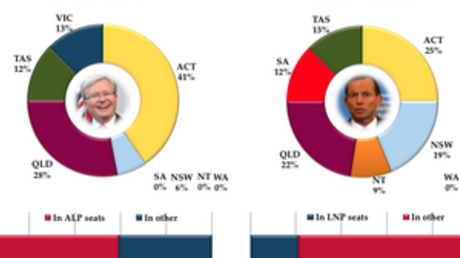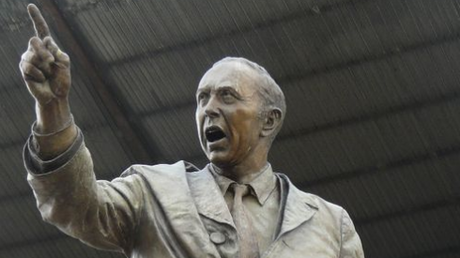
For a style of debate designed to minimise any chance of direct response, argument and comparison between the leaders, last night’s forum was a refreshing surprise.
Unlike last week’s ‘debate’, straight answers were given, both Kevin Rudd and Tony Abbott were forced to answer each other’s charges and adopt engaging speaking styles. As a result, the discussion moved beyond spin and political slogans, differences between the leaders begun to be established and the audience was rewarded with an interesting, sometime riveting, spectacle that did some justice to the intelligence of the two men hoping to lead the country. This was much closer to what one would consider a true debate.
Whether it was the absence of lecterns, the audience of punters rather than journalists or simply changes in opinion poll standing, the forum forced the each leader to be much more responsive to what the other was saying.
This was much closer to what one would consider a true debate
Mr Rudd exemplified this new combative spirit from the beginning; he emphatically repeated simple questions (“Where will the money come from?”) to push Mr Abbott on doubts about coalition policy costing when clear answers weren’t given. Every positive point that the Prime Minister made was finished with a direct challenge to the Opposition Leader to provide an answer. This, backed up by confrontational body language that at times made Mr Abbott take a step back, gifted Rudd with ownership of the issues in the early part of the debate - something made clear by Mr Abbott’s concessionary remark about the PM never shutting up.
The Opposition Leader only began to gain ground when the discussion shifted to his traditional issues of strength such as refugee policy and tax reform, but even so, Mr Rudd was able to blunt his effectiveness by pre-empting what his responses would be by, for example, stating that the asylum seeker issue deserved “more than three word slogans”. Even though he had no chance to reply, the PM was able to characterise anything that would be said as lacking depth and thus legitimacy.
Mr Abbott responded well, totally avoiding the “stop the boats” terminology in favour of a more nuanced answer. As both men called each other to account, differences in policy, leadership style and underlying philosophy were revealed.
The Leaders were not only more responsive to each other, but also the questions that were being asked of them by the audience. Rather than adopting the and incredibly frustrating method of evading politically difficult questions, Mr Rudd and Mr Abbott were forced to offer straight answers.
The audience was gifted with discussion that was both meaningful and interesting to watch
Again it was Mr Rudd who excelled - in particular when asked about the sometimes disappointing quality of major party candidates. His frank admission to the failure of Labor to select the right people (as opposed Mr Abbott’s obfuscation) was strategic, as it both conveyed a respect for the intelligence of the audience and then allowed him to point to both achieved and desired reforms.
In great contrast to the previous week, Mr Rudd overcame his tendency to waffle and lecture by placing priority on giving a simple answer at the beginning of each response. This was assisted by his clear signposting, where he used numbers to delineate the different levels and elements of his answers.
Mr Abbott is traditionally considered to be a clearer speaker, but he often confused his message by refusing to be frank about areas of agreement between the two major parties. Not every point of discussion presents an opportunity to bludgeon your opposition, and attempting to do so can actively weaken the instances where there is an argument to be won.
Like similar ‘town hall discussions’ that are common in US Elections, the candidates were made to think more about how they presented themselves and their arguments. Being in front of a live audience, rather than a camera and panel of journalists, meant that Mr Rudd and Mr Abbott had a greater imperative to be appealing and a way to access instant feedback.
For Mr Abbott this meant adopting a considered and polite approach to those asking him questions that was low risk and conveyed a prime ministerial air. Mr Rudd seemed to revel speaking to his home state audience and his status as the underdog and accordingly adopted a riskier, but more engaging strategy that sought to provoke Mr Abbott. Compared to the boring and rehearsed manner adopted in the previous debate, both leaders delivered on this front.
Last night’s forum didn’t require a more activist moderator to deliver a better debate than the previous week. Placed in an environment where not acknowledging your opponent or their allegations would look strange, the leader’s discussion was inevitably more comparative. In this context Mr Rudd’s strategy to aggressively question the opposition leader worked effectively.
Yet, it wasn’t only Mr Rudd who came out on top, as he pushed the forum closer to a real debate, the audience was gifted with discussion that was both meaningful and interesting to watch.




